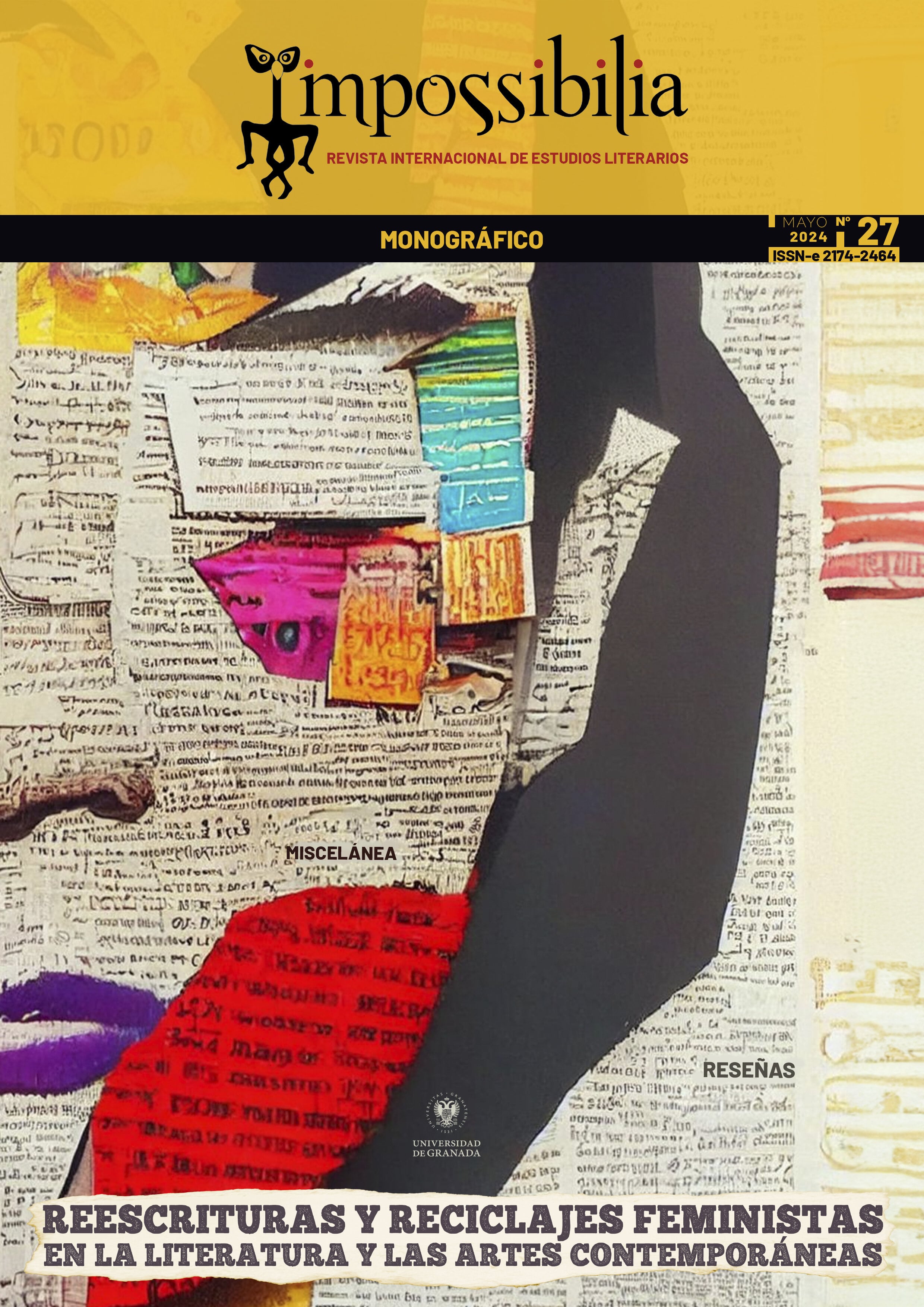“We had no voice”: Class Inequality Through Écriture Femenine in Margaret Atwood's The Penelopiad
DOI:
https://doi.org/10.30827/impossibilia.272024.29748Keywords:
Margaret Atwood, Marxist feminism, Écriture Feminine, Matrixial Subjectivity, Rewriting, MythAbstract
In Margaret Atwood’s The Penelopiad (2005), Penelope is associated with Artemis, the female-goddess cult leader, and the twelve maids, with her followers. These mythological figures belong to the Minoan matrilineal culture that was eradicated by the patriarchal civilization of Greece. Margaret Atwood’s intention, rewriting a feminist version of Penelope’s myth, is used as a response to patriarchal myths that have influenced readers through generations. The Penelopiad retells the Odyssey events from the Other’s view —the women servant’s experience. This article explores the consequences of class difference between Penelope and the maids from the Marxist feminist perspective of Charlotte Perkins (1899). The maids’ chorus language will be compared to écriture feminine by Hélène Cixous (1976) and Bracha Ettinger’s Matrixial Subjectivity (2020) with the aim of finding out how the text raises the voices of forgotten, marginalized and invisibilized women.
Downloads
References
ATWOOD, Margaret (2005). The Penelopiad. Edinburgh: Canongate.
CIXOUS, Hélène (1976). The Laugh of the Medusa. (Trans. COHEN, Keith and COHEN, Paula). Signs, 1(4), 875-893. Disponible en: https://www.jstor.org/stable/3173239.
DURAND, Gilbert (1979). De la Mitocrítica al Mitoanálisis. Barcelona: Siglo Veintiuno.
DURAND, Gilbert (2013). De la mitocrítica al mitoanálisis: figuras míticas y aspectos de la obra. Barcelona: Anthropos.
ELSALAM, Dina (2023). The Maids in Margaret Atwood’s The Penelopiad: Transgenerational Haunting. Transcultural Journal for Humanities and Social Sciences, 4(3), 27-41. Disponible en: https://tjhss.journals.ekb.eg/article_309688.html
ETTINGER, Bracha; & POLLOCK, Griselda (2020). Matrixial Subjectivity, Aesthetics, Ethics. Volume 1, 1990-2000. London: Palgrave Macmillan.
JUNG, Carl Gustav (1968). The Archetypes and the Collective Unconscious. Princeton: Princeton University Press.
KOUTSOPETROU, Sotiria (2019). Rape and Rape Culture in the Ancient Greek Culture? Was rape “really” rape in Ancient Greece? [Master Thesis]. Bergen: University of Bergen.
LÉVI-STRAUSS, Claude (1958). Anthropologie Structurale. Paris: Plon.
LOSADA, José Manuel (2022). Mitocrítica cultural: Una definición del mito. Madrid: Akal.
MAMBROL, Nasrullah (2016). Écriture Feminine. Literary Theory and Criticism, May 14 2016. Disponible en: https://literariness.org/2016/05/14/ecriture-feminine/
MOR, Barbara, SJÖÖ, Monica (1987). The Great Cosmic Mother: Rediscovering the Religion of the Earth. New York: Harper One.
PERKINS GILMAN, Charlotte (1898). Women and Economics: A Study of the Economic Relation between Men and Women as a Factor in Social Evolution. Boston: Small, Maynard & Co.
RAYMOND, Janice G. (2013). Not a Choice, Not a Job: Exposing the Myths about Prostitution and the Global Sex Trade. Washington: Potomac Books.
RODRÍGUEZ, Gerardo (2015). Close as a Kiss. The Challenge of the Maids. Gyn/Affection in Margaret Atwood’s The Penelopiad. Amaltea, (7), 19-34. Disponible en: https://revistas.ucm.es/index.php/AMAL/article/view/47697/46671
ROUSH, Faith (2019). Medusa as an example of Female Sexuality in both Ancient and Present times (1–). Conference Proceeding. 04-09-2019. Disponible en: https://oaks.kent.edu/node/8041
STAELS, Hilde (2009). "The Penelopiad" and "Weight". Contemporary Parodic and Burlesque Transformations of Classical Myths. College Literature, 36(4), 100-118. Disponible en: https://www.jstor.org/stable/20642058
SUZUKI, Mihoko (2007). Rewriting the Odyssey in the Twenty-First Century: Mary Zimmerman's Odyssey and Margaret Atwood's Penelopiad. College Literature, 34(2), 263-278. Disponible en: https://www.jstor.org/stable/43939116
ZEHREN, Evelyn. (2016). Penelope’s Web or Through the Looking-Glass, and What Margaret Found There. Mythmaking in Margaret Atwood’s Penelopiad. Master Thesis. Oldenburg: Universität Oldenburg. Disponible en: https://journals-sagepub-com.bucm.idm.oclc.org/doi/10.1177/1350506818769918
Published
How to Cite
Issue
Section
License
Copyright (c) 2024 Impossibilia. Revista Internacional de Estudios Literarios

This work is licensed under a Creative Commons Attribution-NonCommercial-NoDerivatives 4.0 International License.

You are free to share, copy and redistribute the material in any medium or format under the following terms: You must give appropriate credit, you may not use the material for commercial purposes and No Derivatives. Commits to respecting third party intellectual property rights.
Reception and proccesing of papers has no costs for authors.
Author assumes responsibility for the ideas contained in the article.
Papers must be original and must not have been published before and at the moment they are submitted, papers should not be in the process of evaluation by any other electronic or printed media.
The authors are allowed and recommended to publish their published work through the internet. It could produced interesting exchanges and increase the published work citation. (See El efecto del acceso abierto).




















